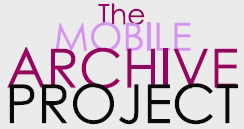Mobile Archives: Virtual Workshop on November 10
The study of colonial America originated as a nationalistic, even patriotic enterprise. States, countries, municipalities, regions, and other groups (often geographically defined) established cultural genealogies, showing the “starting point” of an imagined political unit. With the rise of hemispheric, comparative, and transatlantic studies, however, these etiological narratives have come under scrutiny. Old continuities, once taken for granted, have been complicated, deepened, and enriched. The painful legacies of colonial violence--including enslavement, migration and removal--demand increased attention to how archival epistemologies carry colonial pasts into the present.
The attention to mobilities across time and space thus necessitates a critical look at one of the anchoring institutions in early American studies, the archive. Often established with a geographic basis, and usually bracketed by dates, the archival collection inevitably renders a given moment or object or angle of inquiry more relevant than others. Practicalities, of course, shape these decisions. Scholars travel to Pennsylvania to investigate Revolutionary Philadelphia, Massachusetts to understand Puritan New England, and so on. But how did archival materials themselves travel? Letters were sent, objects changed hands, spaces were imagined, entire collections would migrate over time. This mobility belies the instability of any claim to archival “rootedness.”
The time is ripe for reconsideration. Digitalization has challenged the locational grounding of early Americanist scholarship. Where scholars have always been encouraged to make physical contact with a given scholarly artifact, funding to the physical archive has diminished; at the same time, online scans are increasingly accessible. Travel restrictions due to a global pandemic, meanwhile, have pressed the issue of remote access into the realm of necessity.
How then should scholarship follow suit? Limited travel, and the possibilities opened by online access, necessitate a break in old practices. While archival research has long been regarded as the driver of innovation, access to collections has upheld institutional hierarchies. Gender, economic disparities, and geographic differences have played an overdetermined role in knowledge production. Increased attention to the living legacies of the colonial past, finally, demands greater attention to how our present-day past slips beyond set boundaries of space and time.
The inevitable restructuring of access and research challenges the role of the archive in a post-pandemic context. Will institutional access be restricted to digital environments only? What constitutes the allure of the archive, and how does it impact knowledge networks in historical and cultural studies? In what ways will material culture be accessible, and how will more unexpected connections unfold? Will future access remain bound to the monetization of digital resources and thus the purchasing power of research institutions? With renewed crossover between traditional and creative scholarship, how can silenced pasts be recovered alongside conventionally recorded and documented past?
Topics to be considered include, but are not limited to:
- Intersections of Nationalism and the Archive
- Hemispheric and transatlantic interventions on colonial archives
- Presentism and the colonial past
- Translation and circulation of scholarly traditions
- Digital v. on-site scholarship
- Archives and material culture
- Access and scholarly privilege
- Space and time in archival projects
- Futures of archival scholarship
Contact Email: mobilearchiveproject@gmail.com
Program
3:00 pm CET (9 am EST): Welcome
Marcel Hartwig (University of Siegen), Thomas Hallock (University of South Florida)
3:15 (9:15 EST) Panel I: Archival Preservation and Recovery
Martin Brückner, Hee Eun Kim, Victoria Sunnergren (University of Delaware):
“Introducing THINGSTOR.ORG – A Material Culture Database”Edward Polanco (Virginia Tech)
“Native Voices in Mexico’s Archivo General de la Nación”Will Glover (Boston University)
“The State of the Archive & Native American petitions”Karen Kilcup and Catherine Bowlin (University of North Carolina Greensboro)
“Accessing the Archive: American Children’s Environmental Writing for Everyone”Chair: Lukas Etter (University of Siegen)
4:15-4:30 (10:15-10:30 EST) Break
4:30 (10:30 EST) Panel II: Translations, Temporal and Spatial
Ilka Brasch (University of Hannover)
“Archives and Architectures in Philadelphia”Marcelo Jose Cabarcas Ortega (Fundación Universitaria Colombo Internacional)
“Either Witch or Saint: On Excavating the Colonial Archive or the Vindication of the Female Enslaved”Kirsten Iden (University of South Carolina, Salkehatchie)
“Eliza Lucas Pinckney’s Digital Edition and the Possibilities of Online Archives”Lenin Martell (UAEM) & Celeste González de Bustamante (University of Arizona)
“Mobile Archives Online: A Pedagogical Approach to Understand the US-Mexico Border”Chair: Astrid Fellner (Saarland University)
5:30-5:45 (11:30-11:45 EST) Break
5:45 (11:45 EST) Panel III: Denationalizing the Archive
Steffi Dippold (Kansas State University)
“Un-American Outsiders and Marooned Orphans of the Early American Archive”Sämi Ludwig (Université de Haute-Alsace)
“Why A Colonial Text Is Neglected: The Example of Robert Rogers's Ponteach (1766)”E. Thomson Shields (East Carolina University)
“Finding the Loss of the Lost Colony”Dominique Polanco (Virginia Tech)
“The Biblioteca Nacional de España’s History and Collection of the Pintura del gobernador, alcaldes y regidores de México and Other Mesoamerican Manuscripts”Chair: Ralph Bauer
6:45 (12:45) Final Discussion
Facilitators: Lenin Martell (UAEM) & Markus Heide (University of Hildesheim)
Brief Thoughts: Ralph Bauer, Astrid Fellner, Thomas Hallock, Marcel Hartwig
Open Discussion



